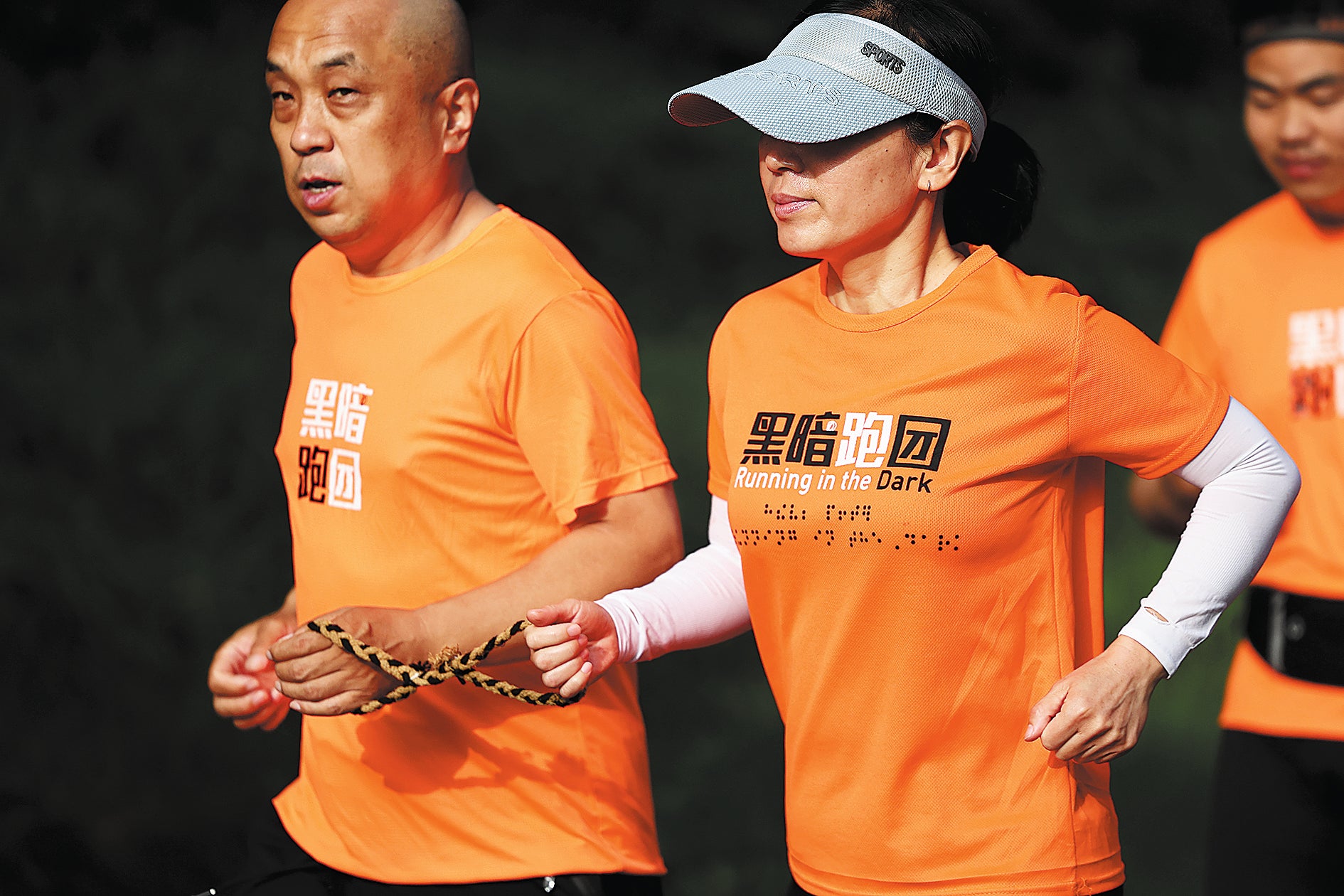Volunteers guide runners in overcoming adversity
THE ARTICLES ON THESE PAGES ARE PRODUCED BY CHINA DAILY, WHICH TAKES SOLE RESPONSIBILITY FOR THE CONTENTS

Every Thursday and Sunday morning, a group of runners with impaired vision or hearing sets off from a rest area near the south gate of Beijing Olympic Forest Park.
The area, one of several established at the park last year, sits beside the running and walking track, and serves as a warm-up base for the runners, who are accompanied by volunteers as they aim to improve their fitness levels.
Running not only benefits these athletes by enhancing their physical well-being, it also has a beneficial effect on the volunteers, who are inspired by their charges’ perseverance, determination and optimistic outlook.
At 8am on a sunny morning in May, Yao Taotao, 38, who has retinitis pigmentosa – a chronic hereditary eye disease – and has been legally blind since he was one year old, did some stretches before taking to the track. He followed the movements of two volunteers, who act as regular trainers.
The three runners set an impressive pace, completing the 3.1-mile lap of the southern part of the park within 40 minutes.
Yao and one of the volunteers were connected by a hemp rope as they ran at the same pace. They rarely spoke – the only sounds being the slight summer breeze and the runners’ breathing and footsteps.
“As I can no longer see, I place all my trust in the volunteers when I run,” Yao said.
Yao was one of 15 people with impaired vision or hearing who ran at Olympic Forest Park on the day, who were accompanied by more than 30 volunteers.
This activity, which has been staged for the past five years, is organised by the Beijing branch of Running in the Dark, a charity running group formed in October 2019.
The founder and organiser of the group’s branch in the Chinese capital is He Xiaoyun, 52, a Beijing native. She and about five regular volunteers hold charity runs at Olympic Forest Park on Thursdays and Sundays at 7am and 8am.
About 1,600 volunteers have joined the Beijing branch, ranging in age from 5 to 74, and assisting more than 400 visually impaired and hearing-impaired runners. Volunteers accompanying the athletes walk or run varying distances, either walking for 1.86 miles, or running for 3.1 miles, 6.2 miles or 9.3 miles.
One or two days before a run, the volunteers post registration links on the branch’s WeChat group, specifying their preferred distance and starting time. Volunteers from the logistics team, which usually comprises about 10 people, accompany visually impaired runners from the subway station and assist them during the run.
After registration, the volunteers meet up with the runners and gather at the rest area. One of the volunteers then leads a warm-up routine, which includes exercises such as turning, high-knee steps, and walking on the spot. Experienced volunteers offer additional support by holding visually impaired participants’ hands or arms.
Ding Hua, 47, the mother of a 16-year-old daughter, has worked as a volunteer for the charity group for about two and a half years. She learned about Running in the Dark when she met with a visually impaired runner from the group on the Beijing subway last year.
She said she enjoys being part of the charity group and running with visually impaired people because everyone is willing to communicate and connect with each other.
Many of the runners she accompanied reached the finishing line without making any stops.
“This gives me a sense of achievement, which is hard to find elsewhere in my daily life, as I am usually busy looking after my child and doing housework,” she said.
Running can be enjoyable, but it is difficult to share enthusiasm for the sport with others, Ding said. “That’s where companionship comes in. By sharing the positive energy, excitement and upbeat attitude that comes from running and other forms of exercise, you help those who are visually impaired, or who are experiencing negative emotions,” she said.
Subscribe to Independent Premium to bookmark this article
Want to bookmark your favourite articles and stories to read or reference later? Start your Independent Premium subscription today.